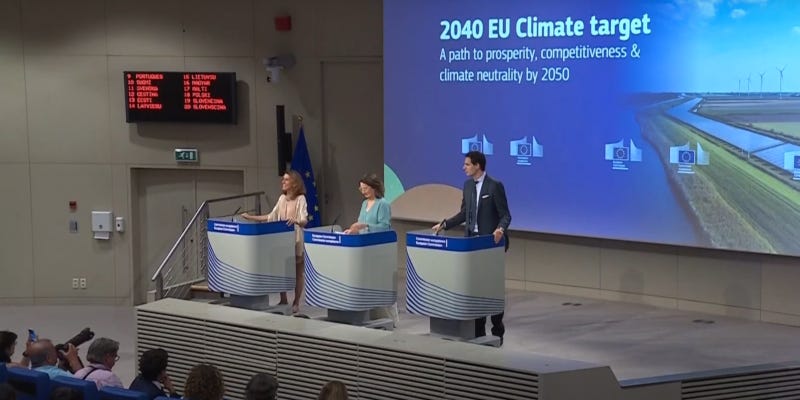The EU is proposing to buy hundreds of millions of carbon credits by 2040. With no analysis of either the economic or the climatic impacts
“The European Commission chose to cook the books instead of protecting the climate.”

In July 2025, the European Commission proposed an amendment to EU climate law that would allow carbon credits to be used to meet greenhouse gas emission targets by 2040. The loophole could see the EU buying carbon credits amounting to more than the annual emissions of entire countries.
Under the proposal the EU would reduce its emissions by 90% by 2040 compared to 1990. Between 2036 and 2040, the EU would be allowed to meet 3% of this reduction target by buying international carbon credits under Article 6 of the Paris Agreement.
Governments are expected to vote on the proposal on 18 September 2025. The legislation detailing how the EU would buy carbon credits is anticipated towards the end of 2026.
3% may not sound like much. But as Carbon Market Watch points out in a critique of the EU’s proposal, it’s 3% of the EU’s emissions in 1990, not 3% of the emissions target for 2040.
And depending on exactly how the use of carbon credits is calculated, by 2040 the EU could have bought anywhere between 140 million and 430 million carbon credits. The EU’s target for 2040 is 479 million tons of greenhouse gas emissions.
Politico recently reported on a leaked presentation given by the European Commission to representatives of EU government in mid-July 2025. The presentation details two ways of calculating how carbon credits could be used between 2036 and 2040:
3% of the 90% reduction in emissions amounts to 140 million tons. The EU could buy up to 140 million carbon credits in total between 2036 and 2040.
The EU could phase in carbon credits starting in 2036 to reach 140 million by 2040. The European Commission anticipates that this could result in 430 million carbon credits in total.
Under the second option, the EU would pollute more — and spend more on buying carbon credits. As Carbon Market Watch notes, it could amount to 700 million carbon credits if the EU buys 140 million each year for five years.
An article on the World Economic Forum’s website, co-written by carbon credit ratings agency BeZero, notes that by 2040 the potential total is between 300 and 400 million carbon credits.
While the EU would not buy as many carbon credits as the aviation industry’s carbon trading mechanism, CORSIA, the EU would be the largest sovereign buyer of carbon credits. The EU could dwarf Japan’s Joint Crediting Mechanism and Singapore’s Carbon Tax.
No analysis
Politico made a document request for the Commission’s analysis of the economic impacts and the impact on the climate of the policy.
“We regret to inform you that DG CLIMA does not hold any documents,” the EU’s climate department, DG CLIMA, told Politico.
The European Commission’s impact assessment on the proposed 2040 target, published in February 2024, does not mention carbon credits.
The reality is that carbon credits have an extremely dubious record. “Past experience,” Tiemo Wölken, of the Party of European Socialists, says, “has shown that many of the associated projects either never materialise or fall far short of expectations. The credits mainly served as an excuse to delay and prevent real emissions reductions.”
The European Scientific Advisory Board on Climate Change opposes including Article 6 carbon credits in the EU’s climate target. In a report published in May 2025, the Advisory Board wrote,
Using international carbon credits to meet this target, even partially, could undermine domestic value creation by diverting resources from the necessary transformation of the EU’s economy, including investments in infrastructure, skills and innovation.
The European Scientific Advisory Board on Climate Change recommended an emissions reduction target between 90% and 95%. The European Commission’s target is at the low end of that recommendation and is further weakened by the carbon credit loophole.
In June 2025, 130 civil society organisation, academics, and companies wrote to the European Commission opposing the use of Article 6 carbon credits in EU climate targets.
As Carbon Market Watch concludes,
The European Commission chose to cook the books instead of protecting the climate and prioritised political expediency over effective climate action. The EU executive deemed a safe and prosperous green future for all to be less important than short-sighted realpolitik and cosying up to industry.




Surely *this time* they’ll work